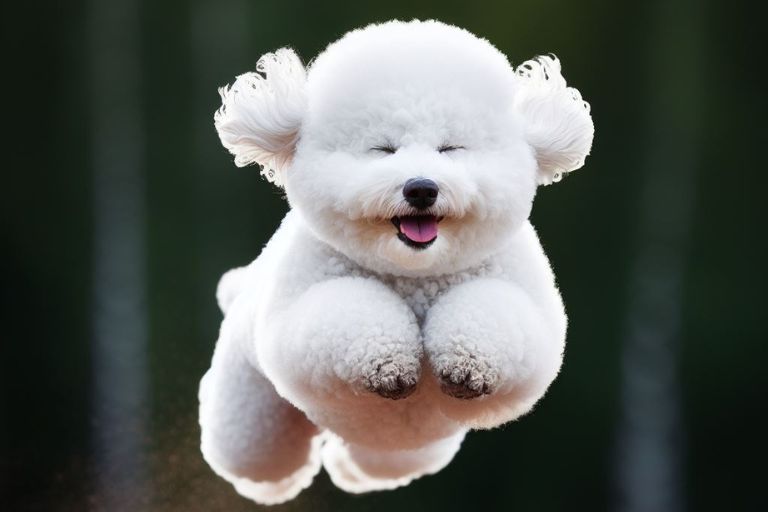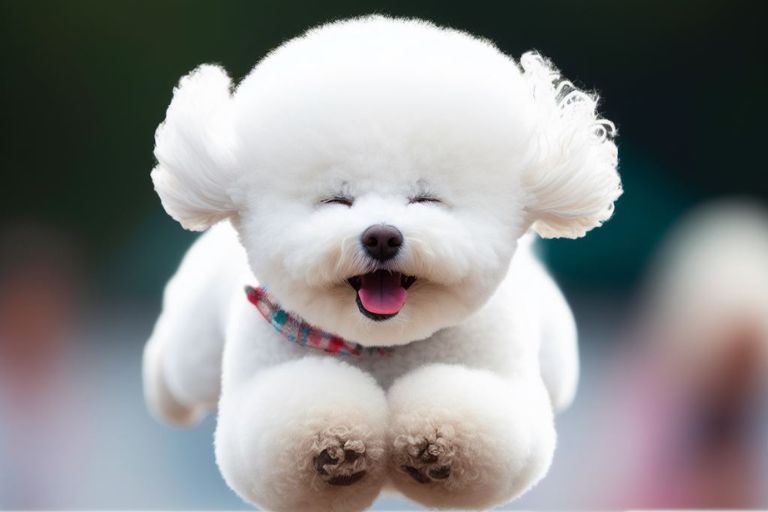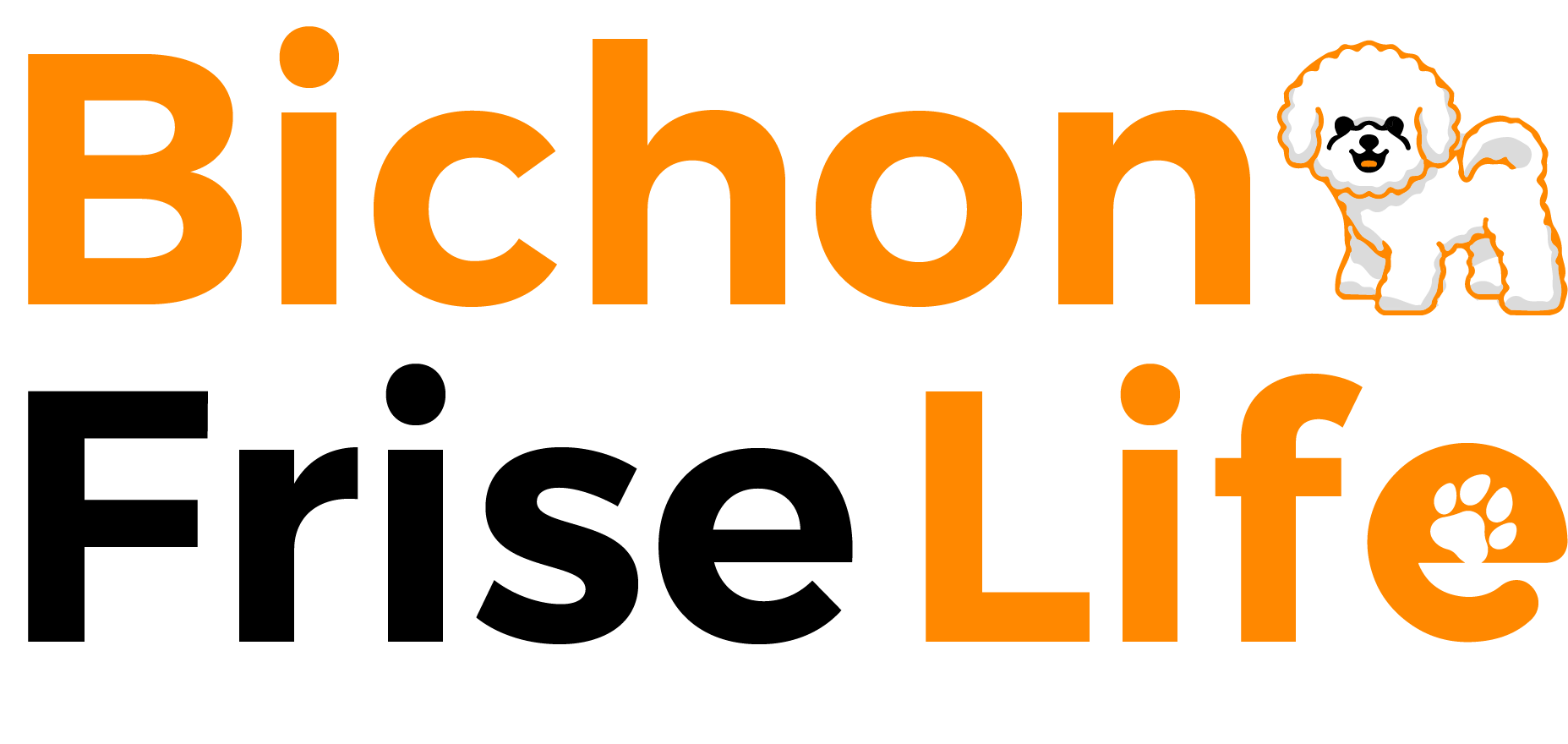Bichons adorability is widely known to every dog lover around the globe. You will seldom find someone who does not adores Bichon Frise from the depth of their heart. These fluffy lap dogs are not only adorable and obedient, but also quite active. Although they are fit to be toy dogs and Bichon Frise companion dogs are also very well known, but they can be active as well as agile. They can run and jump and walk for long distances. Most people who have never adopted Bichon Frise may have numerous questions like how high can a Bichon Frise jump? or what is Bichon Frise walking behavior?
Table of Contents
This site is designed perfectly according to your designs so that you can find answer to all your queries. You can learn about every minute Bichon Frise detail so that if you want to adopt Bichon Frise or if you already have a Bichon Frise at your home, you will never face any problem.
How High Can A Bichon Frise Jump In Feet?
Jumping is not a physical feature like height or weight. It is more like an individual ability. Therefore, it has no exact value which is true for all Bichon Frise. But still we can always tell an average value which is close to that observed for majority Bichon Frise. As far as Bichon jumping height is considered, it can jump to a height of almost 2 feet.
Although it is average height of Bichon jump, but it still does not hold true for all Bichon Frise. This happens because Bichon Frise jump depends upon many other other features like health condition, Bichon body weight, Bichon Frise height and Bichon Frise joint. Let us discuss more about the contribution of these factors to Bichon Frise jumping length.
Impact of Bichon Frise Physical Attributes On Jumping Length
1. Bichon Frise Age
Age has a huge impact on Bichon Frise jumping behavior, therefore you will observe different jump length in different Bichon age groups:
- When Bichons are of young age their muscles are still developing. As a result their body to muscle coordination may be weak resulting in jump of lower height.
- Bichon between the age a few months to 6 years can be considered as adult Bichons and this is the most agile age group. In this age group you will observe the maximum height jumps.
- Senior Bichons in most cases face joint issues, pelvic dysplasia and other weaknesses, therefore the jump of Bichon Frise is lower.
2. Bichon Frise Height
Height plays a significant role in predicting the physical activity of your Bichon Frise. This factor should also be considered when training Bichon Frise for different purposes. For example you need to adjust obstacle according to Bichon Frise height. As far as impact of height is considered on jumping ease, shorter Bichons are more compact in size and can jump easily.
3. Bichon Frise Weight
Understanding the effect of weight on the Bichon Frise physical activity is very easy. Smaller Bichons with normal weight are agile and show higher level of physical activity be it jumping walking or running. On the contrary, Bulky Bichons tend to feel difficulty in physical activity.
4. Bichon Frise Gender
Some might think that gender may impact height of jump, but it is not an important factor. No clear trend is observed in male and female jump height.
Training Bichon Frise Jumping
Bichon Frise jump actively. But still you have to teach Bichon Frise to jump safely. For this purpose you need to keep many things in mind.
Tips for Safely Encouraging Bichon Frise Jumps:
- Provide Adequate Warm-Up: Before engaging in any jumping activities, ensure your Bichon is adequately warmed up. Gentle play and short walks help prepare their muscles for more intense activities.
- Use Positive Reinforcement: Positive reinforcement, such as treats and praise, is key to encouraging your Bichon to jump. Associating jumping with positive experiences makes it a fun and rewarding activity for them.
- Start with Low Obstacles: When introducing jumping activities, begin with low obstacles. Gradually increase the height as your Bichon becomes more comfortable and confident in their jumping abilities.
- Observe Your Bichon’s Comfort Level: Pay close attention to your Bichon’s comfort level and any signs of fatigue or discomfort. Jumping should be a joyful and stress-free activity for them.

Risks of High Jump
Bichon Frise jump can be high. But sometimes it is associated with certain risks. Some of these risks are described below:
Joint Strain
Bichon Frise have small joints, and excessive jumping, particularly from high places, can put strain on these joints. Over time, this could contribute to joint issues, including arthritis or other orthopedic problems.
Back Injuries
The vertebral column of a Bichon Frise is delicate. Jumping from heights might lead to back injuries, especially if they land awkwardly. This is a particular concern for smaller dogs with more fragile spines.
Muscle Strain
While Bichons are generally agile and energetic, excessive jumping can cause muscle strain. This is particularly true if they are not properly warmed up before engaging in jumping activities.
How To Prevent Jumping Risk In Bichon Frise?
Moderation Is Key
Encourage moderate jumping and avoid activities that involve consistently jumping from high places. This helps reduce the risk of injuries and strain on their delicate bodies.
Provide Soft Landing Surfaces
If your Bichon enjoys jumping onto furniture or beds, consider providing soft landing surfaces like pet stairs or cushions to minimize the impact on their joints.
Regular Vet Checkups
Schedule regular veterinary checkups to monitor your Bichon’s overall health, especially their joints and bones. Early detection of potential issues can lead to effective preventive measures.
Controlled Environments
Create controlled environments for jumping activities. This includes using appropriately sized obstacles for agility training and ensuring that the landing area is free from hazards.
Supervise and Train
Supervise your Bichon during jumping activities and incorporate training commands. This helps in controlling their behavior and preventing excessive or unsafe jumps.
Individuality Is The Key
Now that you know that how high can a Bichon Frise jump, you should remember that every Bichon is unique, and what might be suitable for one dog may not be for another. Understanding your individual Bichon’s physical condition and limitations is key to ensuring they stay happy, healthy, and free from unnecessary risks associated with high jumping. If you have concerns about your Bichon’s jumping behavior, it’s always advisable to consult with your veterinarian for personalized guidance.

Conclusion
In conclusion, Bichon Frise jumping can be a delightful and surprising aspect of these charming dogs’ personalities. With their combination of muscle strength, energetic nature, and positive training, Bichons may just astonish you with their vertical leaps. As a responsible pet owner, always prioritize your Bichon’s well-being and comfort when encouraging any physical activities, including jumping. So, if you ever witness your Bichon showcasing their jumping skills, appreciate the agility and spirit that make these little dogs truly special.
FAQs
Can I train my Bichon Frise to jump on command?
Yes, with positive reinforcement and consistent training, you can teach your Bichon to jump on command. However, it’s crucial to ensure that the height and frequency of jumps are safe for their well-being.
Can jumping behavior be a sign of discomfort or pain in my Bichon Frise?
Yes, sudden changes in jumping behavior, reluctance to jump, or signs of distress during or after jumping may indicate discomfort or pain. If you notice these signs, consult with your veterinarian.

